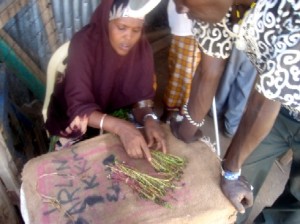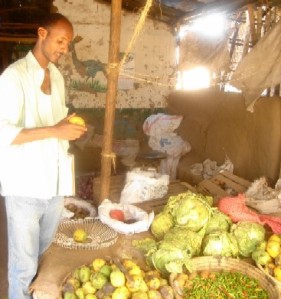Volume 1, Issue 4-5 / March-April 2009
Commercial sex workers in Kakuma Refugee Camp report that they are forced by poverty and dependency to resort to their profession, despite grave risks
Volume 1, Issue 4-5 / March-April 2009
Commercial sex workers in Kakuma Refugee Camp report that they are forced by poverty and dependency to resort to their profession, despite grave risks
Volume 1, Issue 4-5 / March-April 2009
For children living with unknown developmental disorders in Kakuma Camp, the medical situation is unpromising and the future profoundly uncertain.
Volume 1, Issue 4-5 / March-April 2009
With food supplies already meager, refugees must exchange food items for staples such as charcoal, leaving them hungry.
Volume 1, Issue 3 / February 2009
With three-quarters of the refugee population suffering some degree of trauma, JRS has a critical role in providing counseling and psychological services for the mentally vulnerable
Volume 1, Issue 3 / February 2009
A Sudanese girl attempted to commit suicide on Christmas Eve after facing enormous challenges; now, she and her younger sister remain alone, waiting for resettlement to Australia

Volume 1, Issue 2 / January 2009
Refugees were alarmed to see that the food ration package distributed in the second week of January replaced wheat flour with yellow maize meal. Yellow maize meal is rarely eaten even by communities whose staple food is maize. The current malnutrition rate in Kakuma Camp is 15.9 percent of the population, according to a recent UN survey.

Volume 1, Issue 2 / January 2009
The illegal brewing and drinking of chang’aa in Kakuma is a daily reality. With tags like “poison brew” or “kill-me-quick,” chang’aa is an alcoholic brew that can cause death and blindness to its drinkers. Each evening, people strolling in the camp can expect to encounter loud and obnoxious drunks wandering paths and loitering in markets.

Volume 1, Issue 1 / December 2008
Drug abuse among the youth in Kakuma Refugee Camp is a serious and persistent problem. It has caused many youth to lose their hopes, great expectations, and also their dignity. Youth as young as ten years of age are using drugs, while cases of bhang smoking are reported among children as young as seven years of age.

Volume 1, Issue 1 / December 2008
“Little food, more drinks.” It’s a saying you will hear many refugees quote as they discuss the food situation here in Kakuma Refugee Camp.
Currently, a global food crisis that threatens the world economy. Here in Kakuma, the food crisis does not refer to this international phenomenon but to daily food security for refugees.